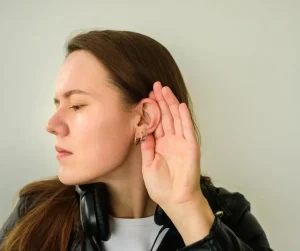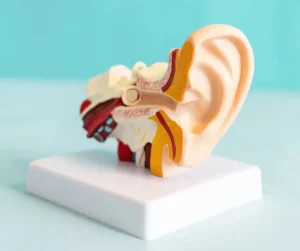
Sennheiser All Day Clear vs Starkey Evolv AI
The Sennheiser All Day Clear and Starkey Evolv AI serve different needs despite living in the same price neighborhood. One’s an over-the-counter option that works
Home » Understanding The Types of Hearing Loss: Causes, Symptoms, and Treatment

Today, we delve deep into the different types of hearing loss, offering a comprehensive guide that covers everything from causes to symptoms and treatment options. We aim to empower you with knowledge so you can make informed decisions for your hearing health. Whether you’re new to hearing aids or a seasoned user looking to understand more, this article provides valuable insights for everyone. Stay tuned as we demystify the causes of hearing loss and how you can take proactive steps for a better quality of life.
Table of Contents
ToggleHearing loss is more common than you may think. In the United States, more than 1 in 10 people experience some degree of hearing loss. The prevalence increases with age: about one-third of adults over 65, and nearly half of those 75 and older, face age-related hearing loss. Even at birth, about 2 in 1,000 babies show signs of hearing issues.
Now that we’ve outlined the different types of hearing loss, let’s explore how severity levels further categorize these conditions.

Understanding these types and their characteristics helps you take informed steps towards better hearing health.
Hearing loss can stem from a range of factors that affect different parts of the ear. Let’s break down the primary causes of the different types of hearing loss they usually result in.

This type of hearing loss combines elements of both conductive and sensorineural causes. For instance, medication affecting the inner ear coupled with a ruptured eardrum would lead to mixed hearing loss.
By understanding what are the causes of hearing loss, you can better manage your hearing health and seek timely treatment when needed.
Find the best hearing aids for active lifestyles.
Recognizing the early signs of hearing loss can be challenging, mainly because it often occurs gradually. Symptoms can vary in severity and type, but here are common indicators organized by the degree of hearing loss.
If you notice any of these symptoms, consult a hearing professional for diagnosis and treatment options. Recognizing the symptoms early can lead to more effective management of your hearing health.
Discover the best hearing aids for tinnitus.
Hearing loss treatments differ based on their type and severity. When addressing different types of hearing loss, prescription hearing aids play a pivotal role in enhancing hearing capabilities. Here’s a breakdown of standard treatment approaches for conductive, sensorineural, and mixed hearing loss and how hearing aids play an important role in non-invasive or surgical options.
While these treatments address specific causes of conductive hearing loss, prescription hearing aids can also be significantly beneficial. They are especially helpful in cases where hearing loss persists even after medical or surgical interventions. Custom-programmed hearing aids amplify external sounds, making them clearer and easier to understand, thus compensating for the hearing loss caused by obstructions or middle ear issues.
Hearing aids amplify sounds, making them more accessible to the auditory system. While sensorineural hearing loss often has more complex causes and effects, prescription hearing aids offer significant help. They allow individuals to better engage with their environment, enhancing communication and overall quality of life.
It’s important to note that while these treatments and devices offer substantial benefits, they may have side effects. For instance, surgeries might lead to complications like graft failure or scarring in conductive hearing loss treatments. Similarly, cochlear implant surgery in sensorineural hearing loss cases can impact balance or residual hearing and, in rare instances, cause nerve damage or cerebrospinal fluid leaks.
Discover the best hearing aids for seniors.
Treatment involves a blend of conductive and sensorineural approaches based on specific ear issues.
In summary, treatment options range from medication and surgeries to advanced devices like prescription hearing aids and, in some cases, cochlear implants. Hearing aids have fewer serious side effects and can help you continue to enjoy the world of sound.

We’ve explored the various aspects of hearing loss. Whether you’re a hearing aid veteran or someone newly affected by hearing issues, this guide aims to empower you with the knowledge needed for better hearing health. Understanding what are the causes of hearing loss, as well as the different types, can help you make the best decisions for your auditory health.
If any of these symptoms or conditions resonate with you, don’t wait to take action. Start your hearing health journey now by taking Injoy Hearing’s online hearing quiz. Early detection and treatment can significantly improve your quality of life.

The Sennheiser All Day Clear and Starkey Evolv AI serve different needs despite living in the same price neighborhood. One’s an over-the-counter option that works

Choosing between two award-winning hearing aids feels impossible when both promise crystal-clear sound. The Starkey Omega AI and Phonak Audeo Sphere Infinio Ultra represent the

Choosing the right hearing aid can enhance communication and confidence. Explore key factors like lifestyle, features, and budget to find your perfect fit.

Your hearing aids came with an app. You downloaded it. Now what? Modern hearing aid apps do more than adjust volume. They let you fine-tune
To start your journey towards better hearing with confidence, Injoy is proud to offer a 45-day risk-free hearing aid trial. This allows you to experience the difference our hearing aids can make, ensuring they meet your expectations and fit your lifestyle perfectly.
Improve your hearing and improve your life today by contacting Injoy to learn more! Call (844) 914-3331

Need hearing aids? Explore our range of hearing aids and discover the best option for your lifestyle and Unique Hearing Needs.
Are you a current patient with us? We're here to help with any adjustments, repairs, or support you may need.